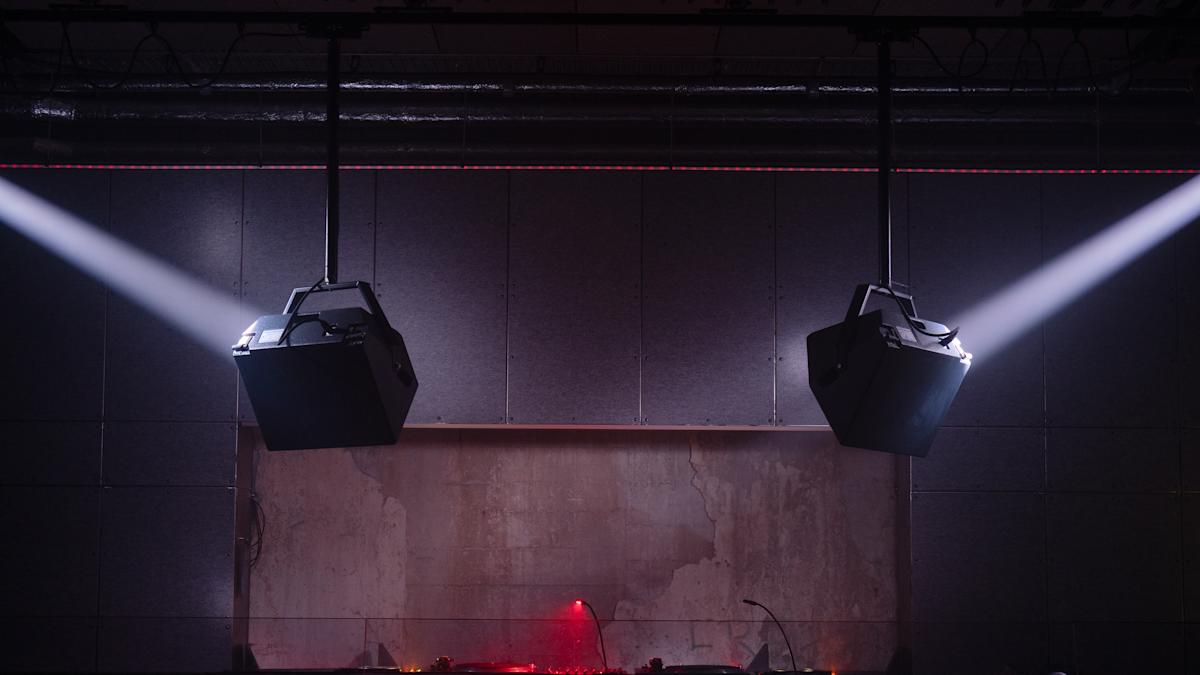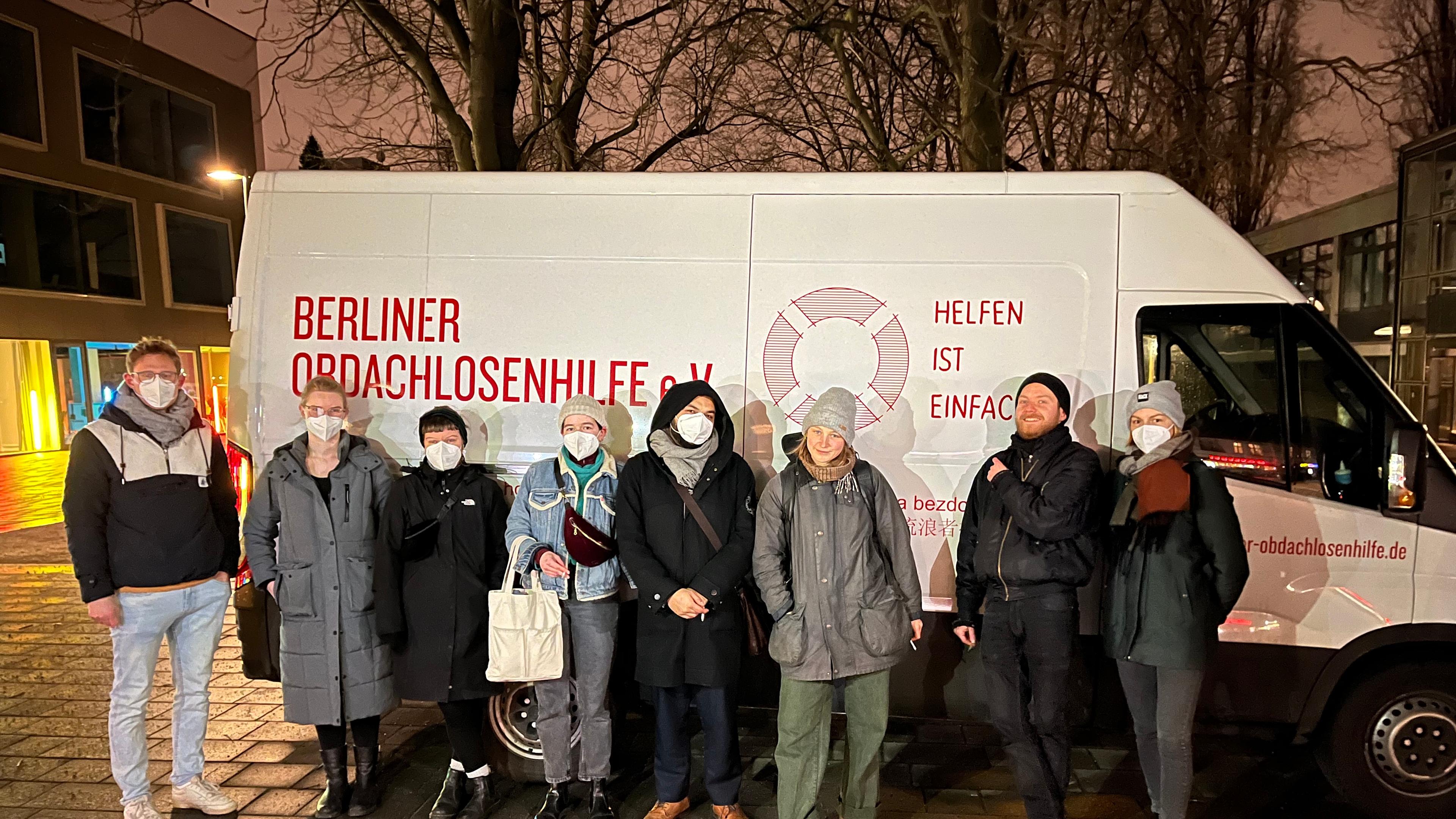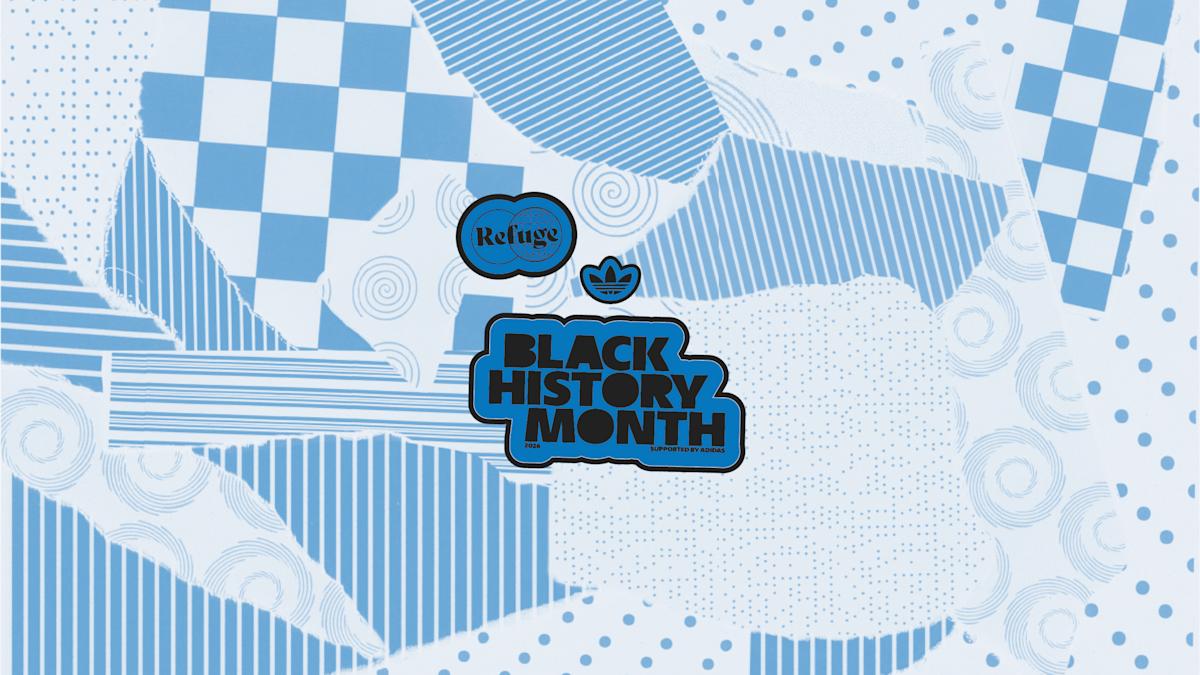
Heavy Feelings and Refuge Worldwide break common ground
We head to Wuppertal in February for a night at Open Ground.
Loading

We tagged along with Berliner Obdachlosenhilfe to bring necessities to the city’s unhoused.
By Steindór Jónsson
Refuge Worldwide staff writer Steindór Jónsson took a tour with Berliner Obdachlosenhilfe, a group of Berliners supporting the city’s unhoused.
-
Since moving here five years ago (I’m tempted to not count the last two), I’ve wanted to get involved in charity work, but like many non-natives I was worried about the language barrier. Before Christmas, I reached out to Berliner Obdachlosenhilfe (BOH) and asked if I could join a Wednesday night tour and write about it for our mostly English-language outlet. They were happy to accommodate me and, as it turns out, German skills were not at all necessary.
On a chilly January afternoon, I arrive at BOH’s office in Wedding where the early shift had been hard at work for hours making hot meals, brewing coffee and prepping box after box of food, clothing and other provisions. Everyone is masked and hygiene rules are posted by the door, as well as info for newcomers. One of the helpers welcomes me, but since I’m still feeling out whether to participate in the tour or just observe it, I spend a few minutes looking around. A large home-made sign on the wall reads “keine Suppe für Rassismus” - “no soup for racism.”
Depending on the night, the tour stops at one or more of Alexanderplatz and Hansaplatz in Mitte, Leopoldplatz in Wedding and Kottbusser Tor in Kreuzberg. Since it’s Wednesday night, we’re hitting the last two spots, starting at Leo. I try to be of some use and help load up the truck, stacking boxes of fruit, sandwiches, yoghurt and pet food alongside picnic tables, benches and a net of sleeping bags hanging from the ceiling. The driver is Julia, who’s only doing her second tour. She started off by donating last summer, but now that she’s more involved she’s shown herself to be one of the most useful people because of her skills driving the van. Drivers are in high demand at BOH, because without one, the tour would be impossible. After a few twists and a pinpoint U-turn, we drive onto Leopoldplatz and park.
The guests are already lining up and we begin to unload the truck. As I carry a bench towards the area where we’re setting up, a friendly elderly woman approaches and asks me a question in German. I try my best to understand, but eventually someone else steps in to assist her. Everything is set up under an overpass in case of rain and the helpers are distanced from the guests to decrease the likelihood of a corona infection spreading. When everything’s ready, one helper takes orders as the others prepare them. As I watch and admire the sheer efficiency, an Italian guest strikes up a chat with me and is patient enough with me as I cobble together answers about my native Iceland and its most recent active volcano.
A break from parties and nonsense
With everything rolling along smoothly, my contact person Tobi has time to chat. He’s been doing tours with the association since October 2017 and is now involved in the organizational side of things, so he’s seen firsthand how the pandemic affected BOH operations, as well as life on the streets. A recent study states that an estimated 60,000 people in Berlin are without a house, with 2,000 to 6,000 of them sleeping rough.
“We’re getting more guests now, both guests who are homeless and guests who are poor,” he says. “Everyone is welcome. We get even more guests in the summer, when we serve up to 300, 400 people at Alexanderplatz. In the past we set up benches for people to sit on and people would stand in front of the table to get the food. Now we set up the benches to maintain some distance and always keep a middle man so we break the infection chain.”
A born and bred Berliner, Tobi hadn’t been involved with charities before he tried BOH. “A friend of mine brought me here one weekend,” he explains. “In life, you do a lot of parties and nonsense so it’s good to do something where you feel good afterwards. I joined up and got to know people. The work makes you feel good and helps your conscience, so that’s why I started and it’s been four years now. I used to go on every tour, but after a few years you get burned out. So I’m more in the background now, sometimes working on the political stuff, the administrative stuff, the plenaries, planning something and working on how we can improve the tours.”
Like most nonprofits, BOH relies on donations. Most of the food and clothes that BOH gives out is donated to them according to their needs at each time, but the money they collect goes towards everything else. “We buy coffee and hygiene products and certain clothes,” Tobi says. “We buy socks and underwear because they rarely get donated but it’s the most needed thing. From time to time we do fundraising for things like sleeping bags, but mostly we get private donations from individuals, not companies. Sometimes groups get together, like the employees from a company who arranged it themselves. It pays for our rent, the gas for the new van we bought last year. We also have two social workers on staff, one person who’s there for administrative tasks and one for cleaning.”
For those who can, it’s simple enough to donate money on occasion with the online click of a button. It’s a good way to help, Tobi says. “I prefer people getting involved,” he adds. “But take your time, learn the basics, get to know the people. We don’t always have enough helpers, because we are an organization of volunteers. Nobody’s earning money from the tours, so we always need more, especially engaged people who have a sense for self-organization.”
Some people are heavily involved, around 40 or 50 members who attend plenary sessions and form workgroups. The rest join the tours when they want. There are three shifts to choose from; the preparation shift at their office, the tours themselves, which usually go from 6:00pm to 9:30pm, and then washing up at the office afterwards. “People just show up when they want to do it. It’s also totally fine if you come just once a month. Some people only come on certain days. A lot of people who are here right now have been coming for a long time. We always talk about how we greet new helpers and make them not feel overwhelmed. We tried a buddy system once and a system where one person leads the group. We manage.”
They like to have upwards of 12 helpers per tour. “And we have 500 to 1000 guests per week. But it depends on the weather, the season, the time of the month.”
Housing first
Berliner Obdachlosenhilfe operates without public funding and they like it that way, Tobi says. They want to remain independent. Tobi’s day job is at a homeless shelter, so he’s very familiar with different sides of the work. I ask him if it takes a toll on the people who spend so much time involved in social issues. “Yes, you need - like we say - a Feierabend.”
I ask him if there’s anything that the BOH community does to lift each other’s spirits, like social outings. I can already tell that some of them are good friends. At one point I notice a helper arriving to join the tour, seemingly after a bit of an absence, and a few others cheerfully welcome them back. “A lot of friendships and relationships developed here,” Tobi says. “We had a party before Christmas and we also celebrated New Year’s together. We went and gave out food and afterwards we cleaned and I heard people were there until 7 in the morning.”
I can tell that the communal aspect helps motivate people to show up in person and lend a hand. But what can be done to address this issue from the policy side? “Housing first,” Tobi says. “In Berlin, we have a lot of foreign homeless people and the German laws make it very hard to help them. Some people may not even be allowed to have a flat in Germany because of their status or their finances. We have an active political advocacy side for these issues. We support a campaign against police violence and the racial, nationalist structures within the police. We ask our helpers to generally not call the police if there’s trouble on our tours because the first thing the police do is check our guests’ identities and that’s where the problems start.”
Bank on it
As Tobi and I talk, the elderly woman from before returns with her husband and explains what had happened when she approached me earlier. Apparently I was bringing the bench I was carrying to the wrong area. She and the other elderly guests are seated separately away from the line and get their meals brought to them. This is new development, Tobi says, as the Corona hygiene system would have forced the elderly to stand among strangers in line. “They used to have to stand in line too,” he explains. “We have more helpers now so we can arrange that. It’s gone well, we haven’t had one case traced to our tours.”
Tobi later tells me that the woman and her husband have been coming for years. We chat with them for a little while and she’s curious to learn the names of all the new helpers, as well as the English word for “Bank” - “bench” - so she can better communicate the setup next time. I start to feel that an unexpected side benefit of joining these tours again is that my German might improve.
Tobi says that either way, a lack of German skills shouldn’t deter anyone from joining up. “Our helpers are very international,” he says. “I used to have tours where I was the only German. Our name helps, because a lot of expats who live here type in Obdachlosen Berlin and we’re the first result on Google, so they come here. We have people from everywhere in the world; India, Mauritius, Ireland, France. I’m maybe the only one here right now who grew up in Berlin.”
After everything’s packed up, I get back in the truck with Julia to hit up our next stop, and this time we’re joined by another helper, Victor. Victor had been looking at different charities before joining up last summer. He’d done charity work in the past, but found it difficult to be sure whether the charities were actually helpful, not to mention politically and ethically sound. But with a homelessness charity, he felt like there was no arguing that he was doing good work. And he could feel it when he joined the tours. He’s been active ever since.
Victor describes BOH as having a low barrier for entry. You can simply sign up and show up. You can come once or come regularly. There’s a sign-up sheet on their website and all help is appreciated. “Your involvement is completely up to you and nobody is forced to do anything,” he says.
When we get to Kottbusser Tor, it’s already 8pm and the cold is hitting everyone, including myself, who foolishly had thought I’d get away with a light bomber jacket in early January. This is not like my pre-pandemic visits to Kotti, a place I’ve always considered rowdy, when I’d hit up restaurants and bars with friends ahead of a big night out. There are fewer people around and also fewer guests lined up for the provisions than at Leopoldplatz. It’s all very orderly and calm by Kotti standards. One of the guests has a dog who barks a little, but he’s probably just excited to receive one of the pet food packages BOH makes available. There’s also boxes from known Berlin grocery stores, restaurants and pastry shops, food that otherwise would be thrown out and go to waste. I stare at a scrumptious looking donut for a while, but think better of it.
With everything looking under control - and since my contribution this time around was minimal anyway - I say goodbye to Tobi, Julia, Victor and the other helpers. Their principle “Helfen ist einfach!” - “helping is easy” - has turned out to be accurate. I’ve already signed up for another tour.
Photos by Steindór Jónsson

We head to Wuppertal in February for a night at Open Ground.

We are partnering with adidas on a 4-part series in February.

Join at Niemetzstrasse between 28th and 30th January.